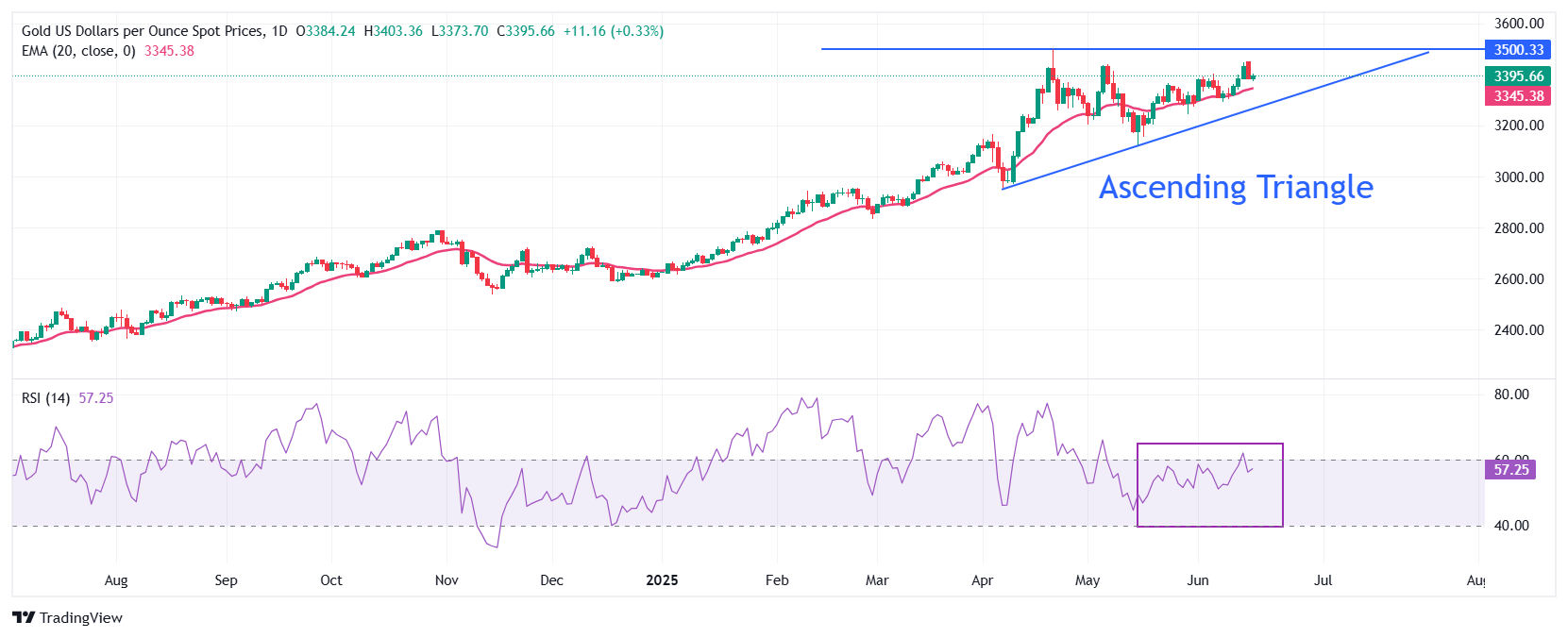Gold Price Forecast: XAU/USD rises near $3,400, remains supported by Middle East tensions
- Gold price moves higher as Middle East tensions improve demand for safe-haven assets.
- Airstrikes by Iranian military forces hit Israeli intelligence agency.
- Investors expect the Fed to keep interest rates steady on Wednesday.
Gold price (XAU/USD) trades 0.4% higher to near $3,400 during European trading hours on Tuesday. The yellow metal edges up as demand for safe-haven assets remains firm amid conflicts in the Middle East.
Airstrikes between Iran and Israel have accelerated after Israeli Defence Forces (IDF) assassinated Iran’s senior-most military official Ali Shadmani, CNBC reported. In retaliation, Iranian military forces have launched ballistic missiles on Israeli intelligence agency Mossad’s headquarters.
Meanwhile, sluggish US Dollar (USD) has also supported the Gold price. The US Dollar Index (DXY), which tracks the Greenback’s value against six major currencies, ticks down to near 98.00. Technically, lower US Dollar makes the Gold price a value bet for investors.
Going forward, investors will focus on the Federal Reserve’s (Fed) monetary policy announcement on Wednesday. The Fed is almost certain to leave interest rates steady in the current range of 4.25%-4.50%.
Investors will closely monitor Fed’s ‘dot plot’, which shows where policymakers see interest rates heading in the near and long term. Additionally, market participants will also focus on fresh inflation and economic forecasts.
Higher-for-longer interest rates by the Fed bode poorly for non-yielding assets, such as Gold.
Gold technical analysis
Gold price trades in an Ascending Triangle formation on a daily timeframe, which indicates volatility contraction. The horizontal resistance of the above-mentioned chart pattern is plotted from the April 22 high around $3,500, while the upward-sloping trendline is placed from the April 7 low of $2,957.
The 14-day Relative Strength Index (RSI) struggles to break above 60.00. A fresh bullish momentum would emerge if the RSI breaks above that level.
Looking up, the Gold price would enter in an unchartered territory after breaking above the psychological level of $3,500 decisively. Potential resistances would be $3,550 and $3,600.
Alternatively, a downside move by the Gold price below the May 29 low of $3,245 would drag it towards the round-level support of $3,200, followed by the May 15 low at $3,121.
Gold daily chart

Gold FAQs
Gold has played a key role in human’s history as it has been widely used as a store of value and medium of exchange. Currently, apart from its shine and usage for jewelry, the precious metal is widely seen as a safe-haven asset, meaning that it is considered a good investment during turbulent times. Gold is also widely seen as a hedge against inflation and against depreciating currencies as it doesn’t rely on any specific issuer or government.
Central banks are the biggest Gold holders. In their aim to support their currencies in turbulent times, central banks tend to diversify their reserves and buy Gold to improve the perceived strength of the economy and the currency. High Gold reserves can be a source of trust for a country’s solvency. Central banks added 1,136 tonnes of Gold worth around $70 billion to their reserves in 2022, according to data from the World Gold Council. This is the highest yearly purchase since records began. Central banks from emerging economies such as China, India and Turkey are quickly increasing their Gold reserves.
Gold has an inverse correlation with the US Dollar and US Treasuries, which are both major reserve and safe-haven assets. When the Dollar depreciates, Gold tends to rise, enabling investors and central banks to diversify their assets in turbulent times. Gold is also inversely correlated with risk assets. A rally in the stock market tends to weaken Gold price, while sell-offs in riskier markets tend to favor the precious metal.
The price can move due to a wide range of factors. Geopolitical instability or fears of a deep recession can quickly make Gold price escalate due to its safe-haven status. As a yield-less asset, Gold tends to rise with lower interest rates, while higher cost of money usually weighs down on the yellow metal. Still, most moves depend on how the US Dollar (USD) behaves as the asset is priced in dollars (XAU/USD). A strong Dollar tends to keep the price of Gold controlled, whereas a weaker Dollar is likely to push Gold prices up.

